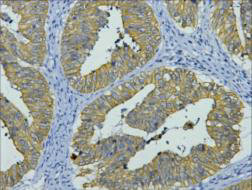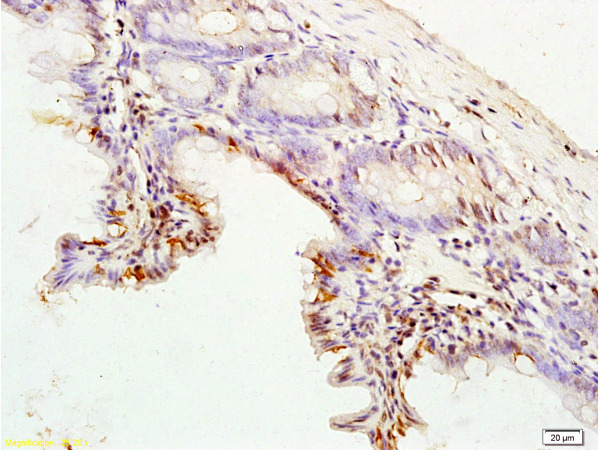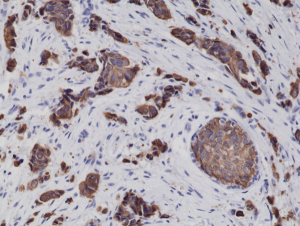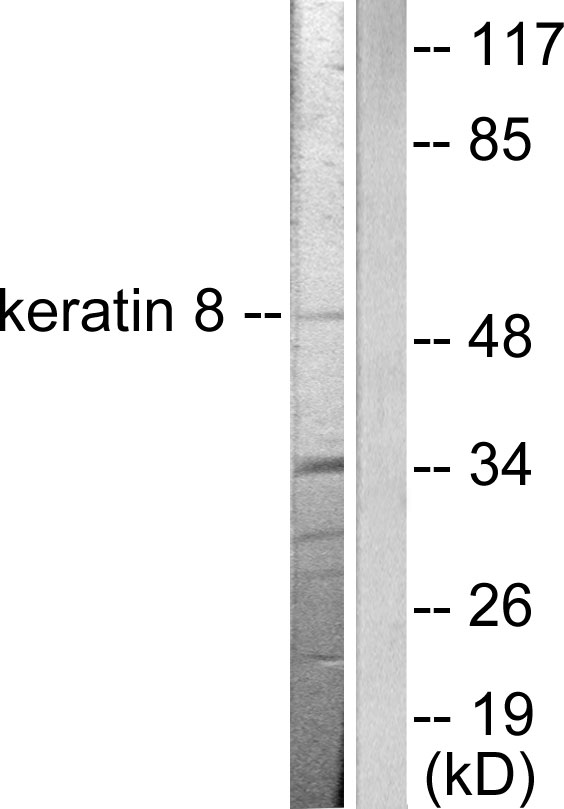KRT8 / CK8 / Cytokeratin 8 Antibody (clone K8/383, Azide-free, BSA-free)
LS-C389632
ApplicationsFlow Cytometry, ImmunoFluorescence, ImmunoPrecipitation, Western Blot, ELISA, ImmunoHistoChemistry, ImmunoHistoChemistry Paraffin
Product group Antibodies
ReactivityHuman, Rat, Zebra Fish
TargetKRT8
Overview
- SupplierLifeSpan BioSciences
- Product NameKRT8 / CK8 / Cytokeratin 8 Antibody (clone K8/383, Azide-free, BSA-free)
- Delivery Days Customer23
- Application Supplier NoteThe applications listed have been tested for the unmodified form of this product. Other forms have not been tested. Cytokeratin 8 (CK8) belongs to the type II (or B or basic) subfamily of high molecular weight cytokeratins and exists in combination with cytokeratin 18 (CK18). Cytokeratin 8 is primarily found in the non-squamous epithelia and is present in majority of adenocarcinomas and ductal carcinomas. It is absent in squamous cell carcinomas. Hepatocellular carcinomas are defined by the use of antibody that recognizes only cytokeratin 8 and 18. Cytokeratin 8 exists on several types of normal and neoplastic epithelia, including many ductal and glandular epithelia such as colon, stomach, small intestine, trachea, and esophagus as well as in transitional epithelium. Antibody to Cytokeratin 8 does not react with skeletal muscle or nerve cells. Epithelioid sarcoma, chordoma, and adamantinoma show strong positivity corresponding to that of simple epithelia (with antibodies against Cytokeratin 8, 18 and 19). Reportedly, Cytokeratin 8 antibody is useful for the differentiation of lobular (ring-like, perinuclear) from ductal (peripheral-predominant) carcinoma of the breast.. ELISA, Flo (0.5 - 1 µg/10E6 cells), IF (1 - 2 µg/ml), IHC, IHC-P (0.5 - 1 µg/ml), IP, WB (1 - 2 µg/ml) The applications listed have been tested for the unmodified form of this product. Other forms have not been tested. Cytokeratin 8 (CK8) belongs to the type II (or B or basic) subfamily of high molecular weight cytokeratins and exists in combination with cytokeratin 18 (CK18). Cytokeratin 8 is primarily found in the non-squamous epithelia and is present in majority of adenocarcinomas and ductal carcinomas. It is absent in squamous cell carcinomas. Hepatocellular carcinomas are defined by the use of antibody that recognizes only cytokeratin 8 and 18. Cytokeratin 8 exists on several types of normal and neoplastic epithelia, including many ductal and glandular epithelia such as colon, stomach, small intestine, trachea, and esophagus as well as in transitional epithelium. Antibody to Cytokeratin 8 does not react with skeletal muscle or nerve cells. Epithelioid sarcoma, chordoma, and adamantinoma show strong positivity corresponding to that of simple epithelia (with antibodies against Cytokeratin 8, 18 and 19). Reportedly, Cytokeratin 8 antibody is useful for the differentiation of lobular (ring-like, perinuclear) from ductal (peripheral-predominant) carcinoma of the breast.
- ApplicationsFlow Cytometry, ImmunoFluorescence, ImmunoPrecipitation, Western Blot, ELISA, ImmunoHistoChemistry, ImmunoHistoChemistry Paraffin
- CertificationResearch Use Only
- ClonalityMonoclonal
- Clone IDK8/383
- Concentration1 mg/ml
- ConjugateUnconjugated
- Estimated Purity...
- Gene ID3856
- Target nameKRT8
- Target descriptionkeratin 8
- Target synonymsCARD2, CK-8, CK8, CYK8, K2C8, K8, KO, keratin, type II cytoskeletal 8, cytokeratin-8, keratin 8, type II, type-II keratin Kb8
- HostMouse
- IsotypeIgG1
- ReactivityHuman, Rat, Zebra Fish
- Storage Instruction2°C to 8°C
- UNSPSC12352203







